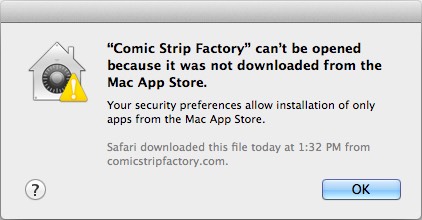With the introduction of a free trial version of Comic Strip Factory you can download from this website, and a version you can buy directly from us instead of from the App Store, some of our customers and potential customers may see a message like this:

What’s going on? In recent versions of Mac OS X, Apple added a security control called Gatekeeper to the operating system. This allows you to have control over what kind of applications you trust to run on your Mac. It’s controlled in System Preferences (accessible from the Apple menu). To get to the gatekeeper settings, choose Security & Privacy from the preferences icons (it’s in the top row), make sure the General tab is selected, and look at these options near the bottom:

They appear greyed out because you have to unlock the options with your password before you can change the settings. To do this, look for this lock icon at the bottom of the window and click it:
It asks for your Mac user name and password. Enter these and press OK.
Now, to allow the direct download version of Comic Strip Factory to run on your Mac, click the “Mac App Store and identified developers” option under “Allow apps downloaded from.” Then you can close System Preferences and you will be able to run Comic Strip Factory.
Wait. What am I doing?! (More than you may need to know, for the particularly cautious.)
All this seem a little scary? Does it make you wonder what you are authorizing? Simply put, this feature recognizes three different kinds of application: Applications from the Mac App Store, applications from members of their developer program that are distributed in some other way, and applications from other sources. What other sources? Maybe they’re from hobbyist developers who don’t want to pay Apple’s annual developer program fees, or maybe they're old applications from before the App Store and application signing was around, and they’re not under active development anymore. Or maybe they’re from a Nigerian prince or Chinese hackers. Yeah, that third option might be a little scary. But we’re not asking you to choose that option. We’re asking you to choose the “identified developers” option.
So what does “identified developers” mean? It doesn’t sound like much, but it means a fair amount. It means that the developer is a paid member of Apple’s developer program in good standing. Developers can be kicked out of this program for unethical code or business practices, so that’s a good thing. It also means that the application is digitally signed by the developer using a certificate issued by Apple. If the application has been modified, or hacked, by some third party, the digital signature won’t allow it to run.
So apps from identified developers sound pretty safe. So why does Apple seem to be trying to scare you away from using them? Probably because they want their default setting to err on the side of greatest caution. And that is definitely what you get from App Store applications. In addition to the protections of using applications from identified developers, you get more with App Store applications. You get the assurance that Apple has validated the application, including each new version of it, before it was made available to you. And you get the assurance that the application follows all of the App Store rules, some of which enforce a level of security in the application that was not availabe to desktop applications before.
However, these same rules come at a cost both to the developer and the customer. The technical requirements actually are so restrictive that they make some classes of application impossible, and for others they may require awkward workarounds. And the App Store itself doesn’t allow some things that have been part of the software publishing business model for decades, like time-limited free trial versions and major upgrades that can be sold to existing customers at a discount. For these and other reasons, a lot of major publishers like Adobe and Microsoft have never sold their most popular applications on the Mac App Store. So if you’re worried about allowing applicatiosn from identified developers, remember you’d have to do the same thing to be able to run Word or Photoshop.